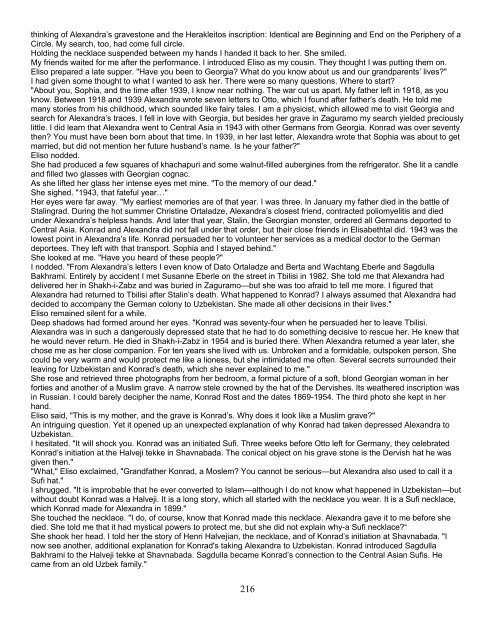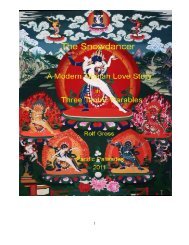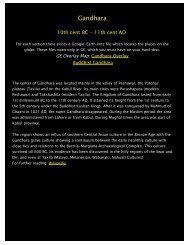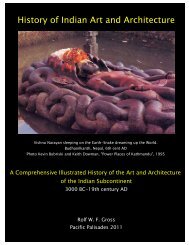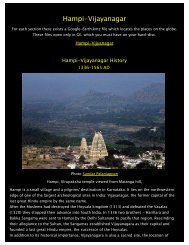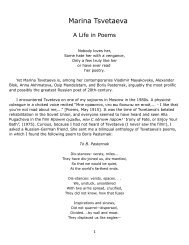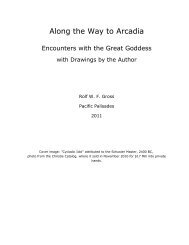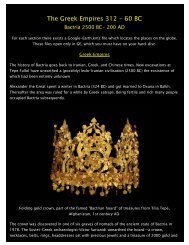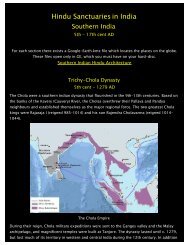Konrad and Alexandra (PDF) - Rolf Gross
Konrad and Alexandra (PDF) - Rolf Gross
Konrad and Alexandra (PDF) - Rolf Gross
- No tags were found...
Create successful ePaper yourself
Turn your PDF publications into a flip-book with our unique Google optimized e-Paper software.
thinking of Alex<strong>and</strong>ra’s gravestone <strong>and</strong> the Herakleitos inscription: Identical are Beginning <strong>and</strong> End on the Periphery of aCircle. My search, too, had come full circle.Holding the necklace suspended between my h<strong>and</strong>s I h<strong>and</strong>ed it back to her. She smiled.My friends waited for me after the performance. I introduced Eliso as my cousin. They thought I was putting them on.Eliso prepared a late supper. "Have you been to Georgia? What do you know about us <strong>and</strong> our gr<strong>and</strong>parents’ lives?"I had given some thought to what I wanted to ask her. There were so many questions. Where to start?"About you, Sophia, <strong>and</strong> the time after 1939, I know near nothing. The war cut us apart. My father left in 1918, as youknow. Between 1918 <strong>and</strong> 1939 Alex<strong>and</strong>ra wrote seven letters to Otto, which I found after father’s death. He told memany stories from his childhood, which sounded like fairy tales. I am a physicist, which allowed me to visit Georgia <strong>and</strong>search for Alex<strong>and</strong>ra’s traces. I fell in love with Georgia, but besides her grave in Zaguramo my search yielded preciouslylittle. I did learn that Alex<strong>and</strong>ra went to Central Asia in 1943 with other Germans from Georgia. <strong>Konrad</strong> was over seventythen? You must have been born about that time. In 1939, in her last letter, Alex<strong>and</strong>ra wrote that Sophia was about to getmarried, but did not mention her future husb<strong>and</strong>’s name. Is he your father?"Eliso nodded.She had produced a few squares of khachapuri <strong>and</strong> some walnut-filled aubergines from the refrigerator. She lit a c<strong>and</strong>le<strong>and</strong> filled two glasses with Georgian cognac.As she lifted her glass her intense eyes met mine. "To the memory of our dead."She sighed. "1943, that fateful year…"Her eyes were far away. "My earliest memories are of that year. I was three. In January my father died in the battle ofStalingrad. During the hot summer Christine Ortaladze, Alex<strong>and</strong>ra’s closest friend, contracted poliomyelitis <strong>and</strong> diedunder Alex<strong>and</strong>ra’s helpless h<strong>and</strong>s. And later that year, Stalin, the Georgian monster, ordered all Germans deported toCentral Asia. <strong>Konrad</strong> <strong>and</strong> Alex<strong>and</strong>ra did not fall under that order, but their close friends in Elisabethtal did. 1943 was thelowest point in Alex<strong>and</strong>ra’s life. <strong>Konrad</strong> persuaded her to volunteer her services as a medical doctor to the Germ<strong>and</strong>eportees. They left with that transport. Sophia <strong>and</strong> I stayed behind."She looked at me. "Have you heard of these people?"I nodded. "From Alex<strong>and</strong>ra’s letters I even know of Dato Ortaladze <strong>and</strong> Berta <strong>and</strong> Wachtang Eberle <strong>and</strong> SagdullaBakhrami. Entirely by accident I met Susanne Eberle on the street in Tbilisi in 1982. She told me that Alex<strong>and</strong>ra haddelivered her in Shakh-i-Zabz <strong>and</strong> was buried in Zaguramo—but she was too afraid to tell me more. I figured thatAlex<strong>and</strong>ra had returned to Tbilisi after Stalin’s death. What happened to <strong>Konrad</strong>? I always assumed that Alex<strong>and</strong>ra haddecided to accompany the German colony to Uzbekistan. She made all other decisions in their lives."Eliso remained silent for a while.Deep shadows had formed around her eyes. "<strong>Konrad</strong> was seventy-four when he persuaded her to leave Tbilisi.Alex<strong>and</strong>ra was in such a dangerously depressed state that he had to do something decisive to rescue her. He knew thathe would never return. He died in Shakh-i-Zabz in 1954 <strong>and</strong> is buried there. When Alex<strong>and</strong>ra returned a year later, shechose me as her close companion. For ten years she lived with us. Unbroken <strong>and</strong> a formidable, outspoken person. Shecould be very warm <strong>and</strong> would protect me like a lioness, but she intimidated me often. Several secrets surrounded theirleaving for Uzbekistan <strong>and</strong> <strong>Konrad</strong>’s death, which she never explained to me."She rose <strong>and</strong> retrieved three photographs from her bedroom, a formal picture of a soft, blond Georgian woman in herforties <strong>and</strong> another of a Muslim grave. A narrow stele crowned by the hat of the Dervishes. Its weathered inscription wasin Russian. I could barely decipher the name, <strong>Konrad</strong> Rost <strong>and</strong> the dates 1869-1954. The third photo she kept in herh<strong>and</strong>.Eliso said, "This is my mother, <strong>and</strong> the grave is <strong>Konrad</strong>’s. Why does it look like a Muslim grave?"An intriguing question. Yet it opened up an unexpected explanation of why <strong>Konrad</strong> had taken depressed Alex<strong>and</strong>ra toUzbekistan.I hesitated. "It will shock you. <strong>Konrad</strong> was an initiated Sufi. Three weeks before Otto left for Germany, they celebrated<strong>Konrad</strong>’s initiation at the Halveji tekke in Shavnabada. The conical object on his grave stone is the Dervish hat he wasgiven then.""What," Eliso exclaimed, "Gr<strong>and</strong>father <strong>Konrad</strong>, a Moslem? You cannot be serious—but Alex<strong>and</strong>ra also used to call it aSufi hat."I shrugged. "It is improbable that he ever converted to Islam—although I do not know what happened in Uzbekistan—butwithout doubt <strong>Konrad</strong> was a Halveji. It is a long story, which all started with the necklace you wear. It is a Sufi necklace,which <strong>Konrad</strong> made for Alex<strong>and</strong>ra in 1899."She touched the necklace. "I do, of course, know that <strong>Konrad</strong> made this necklace. Alex<strong>and</strong>ra gave it to me before shedied. She told me that it had mystical powers to protect me, but she did not explain why-a Sufi necklace?“She shook her head. I told her the story of Henri Halvejian, the necklace, <strong>and</strong> of <strong>Konrad</strong>’s initiation at Shavnabada. "Inow see another, additional explanation for <strong>Konrad</strong>'s taking Alex<strong>and</strong>ra to Uzbekistan. <strong>Konrad</strong> introduced SagdullaBakhrami to the Halveji tekke at Shavnabada. Sagdulla became <strong>Konrad</strong>’s connection to the Central Asian Sufis. Hecame from an old Uzbek family."216


